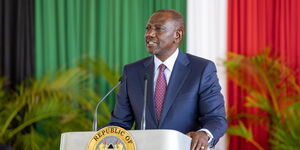Investors and economists have expressed fears over the US dollar remaining the 'global currency' after the dollar fell to a three-year low against the Euro, sparking fresh concerns over President Donald Trump’s erratic trade policies.
Despite the dollar dropping after a huge sell-off in April, the Kenyan shilling dropped slightly against the currency but lost to the Japanese Yen and the Euro.
The Shilling closed the week at Ksh129.48, down from Ksh129.27 the previous week, and has remained around the Ksh129 mark since mid-last year.
The shilling dropped to the strengthening Yen and Euro to close at Ksh88.40 and Ksh142.54, respectively. They both strengthened by nearly Ksh3 in a week when the greenback experienced particularly sharp drops against safe-haven currencies like the Japanese yen, Swiss franc, and euro.
A safe-haven currency is one that investors gravitate towards during periods of market volatility or economic uncertainty, as it is expected to maintain or increase in value.
“There is (now) a very good case for the end of American dollar exceptionalism,” Bob Michele, chief investment officer of JPMorgan Asset Management, told Financial Times.
However, concerns have arisen regarding the role of the dollar in the new world order after investors cautioned about a “tectonic shift” in the global economy if the dollar can no longer be depended upon to offer a safe haven during times of market volatility.
For years, the relative stability of the US economy has allowed the dollar to function as the world’s reserve currency — held by central banks around the world, including Kenya. Any pressures to the dollar send ripple effects to other economies, including Kenya.
The Central Bank of Kenya (CBK) in its weekly bulletin once again noted this trend, pointing to uncertainty in the global economy.
“Global equity markets continued to underperform, driven largely by elevated uncertainties due to the escalation of trade tensions following the implementation of new tariffs on imports to the US,” the CBK said.
Trump reignited trade tensions by imposing a 10 per cent universal tariff on imports, branding it "Liberation Day" for US trade on April 2. China was singled out with a staggering 145 per cent tariff, prompting Beijing to retaliate with 125 per cent duties on American goods.
The escalating tit-for-tat measures have disrupted global supply chains, with Chinese exporters halting shipments and US businesses bracing for inflation and economic slowdown. Economists warn of a looming recession, citing downgraded GDP forecasts and rising unemployment.
While the administration paused higher tariffs for most countries for 90 days to allow negotiations, China remains excluded, deepening the rift between the world's two largest economies.
“Normally, when you see big tariff increases, I would have expected the dollar to go up. The fact that the dollar is going down at the same time, I think, lends some more credibility to the story of investor preferences changing,” Minneapolis Fed president Neel Kashkari said Friday.












